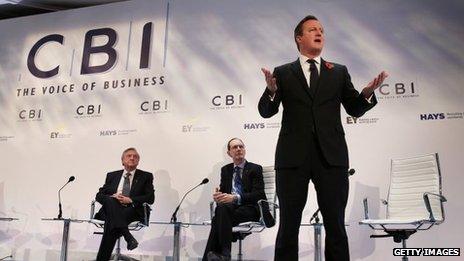Europe: The fight for UK hearts and minds
- Published
- comments

It used to be said, perhaps first by Calvin Coolidge, that: "What's good for business is good for America."
In the UK the main business lobbying organisation the CBI has joined the debate about Britain's future in Europe. Its argument can be summed up as: "What's good for business is good for Britain."
A lengthy study, according to the CBI's director general John Cridland, came "to the unequivocal conclusion that British business, large and small, wants to remain within a reformed EU".
The CBI has produced an array of statistics , externalconcluding that membership of the EU is worth an extra 4-5% of GDP which translates into £78bn a year for the economy. That is presented as the equivalent of £1,225 per individual or £3,000 per household.
The CBI wants to define the choice for the British people as "in with reform" or "out with no influence".
Opening salvos
It is a position supported by the Labour Party, the Liberal Democrats and by David Cameron who told the CBI's annual conference that he could secure a "yes" vote in a promised referendum.
The kind of reforms the CBI would be looking for would include less red tape, removing barriers to e-commerce, and ring-fencing national employment law from EU directives. Despite the CBI's enthusiasm for staying in the EU it does register unease about the creeping extension of EU authority.
The CBI's intervention in this debate follows a drum-beat of statements from the business community; the first salvos in a three-year campaign to get the British people to vote "yes" to Europe.
So we have had Gerry Grimstone, the chairman of financial services industry body TheCityUK saying: "I do not believe the City's pre-eminent position will survive if we lose our role as Europe's financial capital." We have had a report entitled Manufacturing: Our future in Europe which concluded that 85% of UK manufacturing firms support EU membership.

Other indicators have been more cautious. There was a YouGov survey, published by the campaign group Business for Britain, which reported that - by a majority of 46% to 37% - company bosses believed that the costs of complying with the single market outweighed the benefits of staying in the EU.
In October, the think tank Open Europe estimated that the top 100 EU laws cost the UK economy £27.4bn a year.
So the battleground is being marked out. It is much less about a fundamental re-negotiation of Britain's relationship with the EU. It is more about reforming the EU.
It is the road that the rest of Europe is trying to channel the British debate down. Numerous EU leaders have made it clear that Britain will not be able to cherry pick what it likes or dislikes.
There will be no tolerance of further British exceptionalism. Senior German officials have been loud and clear; they are open to reforms if they are for all 28 EU members.
So David Cameron's emphasis, in recent times, has been on making the EU work better. He tried to make the recent summit about cutting red tape. He came armed with a little booklet explaining how "sweeping away barriers to growth" would "benefit all of Europe".
Closed door
The Commission has eagerly supported some of this agenda. They have said that 74% of Europeans believe the EU generates too much red tape.
President Barroso has said the EU should be "big on big things and smaller on small things". In Brussels it is said that there was "blood on the wall" when some regulations were withdrawn by the Commission.
There is a message here. The Commission is saying there is flexibility over reviewing legislation on a case-by-case basis to gauge its impact on competitiveness but the door is closed to a fundamental re-negotiation about the competences of the EU.
Speaking at the CBI conference, David Cameron said: "The argument I have made is not some short-term tactical ploy. It is a long-term strategic choice for Britain: let us reform this organisation. Let us make changes to how it works, and then let's put those changes to the British people in a referendum."
He was clear that EU membership is "overwhelmingly in Britain's economic interests".
So as the argument about Britain's future in Europe develops it appears less about the repatriation of powers or challenging the commitment to "ever closer union" but more about making the EU work more efficiently, with the prime minister being urged to go out and build an alliance for reform.
The question is whether this kind of "reformed" EU will be enough to convince the British public, whose support for EU membership was described again by the prime minister as "wafer thin".